EU Emergency Contraception Accessibility
With the summer holidays just a stone’s throw away, many Brits are looking forward to a sunkissed break in Europe. However, most don’t fully understand how emergency contraception (EC) works across the continent - or how tricky it can be to access in some countries.
In fact, according to our recent survey of 1000 British holidaymakers, 60% are unaware of the rules around buying EC in a European country. A further 13% said having to ask for it in another language would stop them from buying it at all.
The British reality about EC: Our survey findings
First things first, we set out to understand the British public’s understanding of emergency contraception, barriers to access, and what holiday makers typically do if they get caught out while abroad.
The number one issue for Brits appears to be cost, with 17% of respondents reporting they’ve been discouraged from purchasing emergency contraceptive pills due to the price - especially for the 18-24 year old demographic, where this number rises to 40%.
However, when asked, a quarter (25%) admitted they weren’t sure how much it actually costs, with one in 10 18-24-year-olds thinking it cost between £30 and £50. In the UK, EC is available for free at NHS sexual health clinics, GP surgeries, and some young people’s services, and can be bought online from £10 (after clinical review and approval).
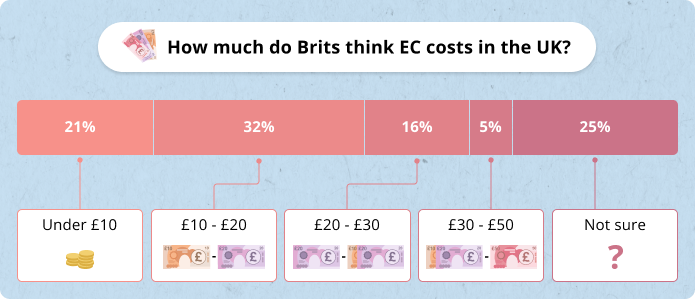
Almost a third (30%) of Brits admitted to feeling judged when they tried to purchase emergency contraception, with 33% of women admitting to this, compared to 26% of men.
Knowledge about emergency contraception effectiveness is also worrying, as 65% believe EC only works within 24 hours - when the reality is it can be effective for up to 5 days, depending on type. 10% of Brits weren’t sure at all how long EC can be used for after having unprotected sex.
Almost half of those surveyed (45%) admitted to having unplanned sex while on holiday, with 52% of men revealing they have, compared to 38% of women.
Similarly, 50% of men said they’ve had sex on holiday without contraception, compared to 32% of women. Interestingly, those under 30 are the most likely to do it, with 40% of men and 38% of women stating they’ve done so in the past.. Holiday flings are also common: around 40% of men and 30% of women have had at least one in their life.
Given that one in eight (12%) of Brits have needed emergency contraception while on holiday, nearly two thirds (61%) are unaware of the rules around buying it in a European country they were travelling to.
Language barriers add another layer of difficulty, with 40% saying they would find it hard to ask for EC in another language, and 13% said it would stop them from getting it altogether.
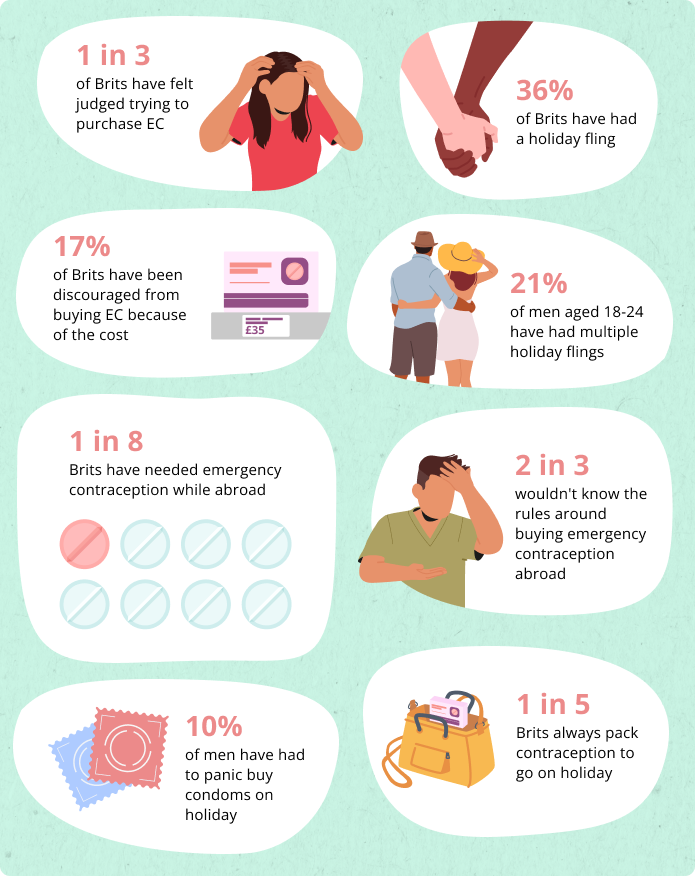
“Emergency contraception is a safe and effective way to prevent pregnancy after unprotected sex, but there are still some real barriers to access. Planning ahead and understanding your options, both in the UK and abroad, can make a big difference in feeling confident and prepared while travelling.” - Dr Bhavini Shah
In our guide, we map out the different EU policies, and share practical tips to make sure you’re covered - no matter where you’re jetting off to.
What is ED and what are the different types?
Emergency contraception is available to prevent pregnancy following unprotected sex (defined as sex without contraception or when contraception might have failed), and it should be used between 3 and 5 days of having unprotected sex - dependent on the type you’re using, but the sooner you use EC the more effective it typically is.
There are two different types of EC: the morning after pill (also known as the emergency pill), and an IUD (also known as the copper coil). An IUD is the most effective type, as it can be fitted within 120 hours after sex, but you need to make an appointment to have one fitted by a nurse or doctor.
Usually, this is done at a sexual health clinic or GP’s surgery, and it consists of a small plastic T-shape being placed into your womb (uterus). These can last for 5 to 10 years, depending on the type.
However, an IUD isn’t always the most accessible- especially when you’re on holiday. That’s where the morning after pill can help, and for this there are two types: Levonorgestrel (LNG), which you need to take within 3 days after sex, and ulipristal acetate (UPA) more commonly known as ellaOne, which you need to take within 5 days after sex.
In the UK, both types of EC are free and available (following a consultation and clinical review) from most sexual health clinics, most GP surgeries, and the emergency pill is free from some NHS walk-in centres, pharmacies and some young people’s services. Many pharmacies also sell the emergency contraceptive pill online.
How much does EC cost around Europe?
While emergency contraception is free in the UK (for UK citizens), the same cannot be said for the rest of Europe. For citizens, costs for the levonorgestrel pill (LNG) can be up to €21, with an average cost of €9.71 for the 34 countries surveyed, while UPA is as expensive as €37.94 in Malta, and has an average cost of €20.17.
There are just 10 countries in Europe where citizens of the country can get emergency contraception for free. France is the only country where both citizens and tourists can get EC for free.
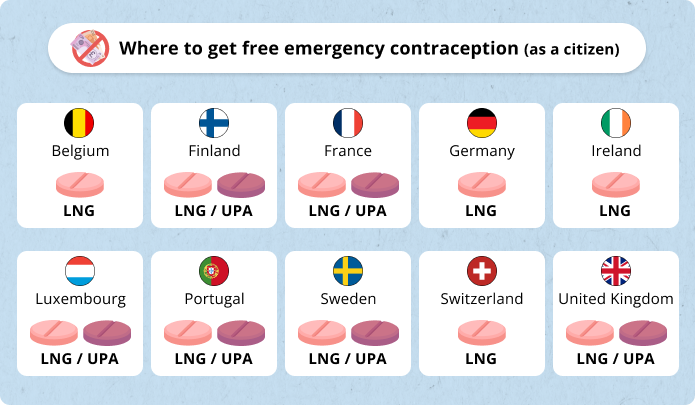
The most expensive place for local citizens to get the LNG morning after pill is Ireland, costing an incredible €40.47, and the same for UPA: Ireland, but it’ll set you back €57.82.
The average cost of emergency contraception in Europe for tourists is €14.1 for LNG, and €25.74 for UPA, which is a lot considering a third of Brits (32%) surveyed said they never pack any types of contraception - regular or emergency - when they go on holiday.
The most expensive places in Europe to get EC
| Type | Country | Cost |
| LNG | Ireland | €40.47 |
| UPA | Ireland | €57.82 |
The least expensive places in Europe to get EC
| Type | Country | Cost |
| LNG | France | €0 |
| UPA | France | €0 |
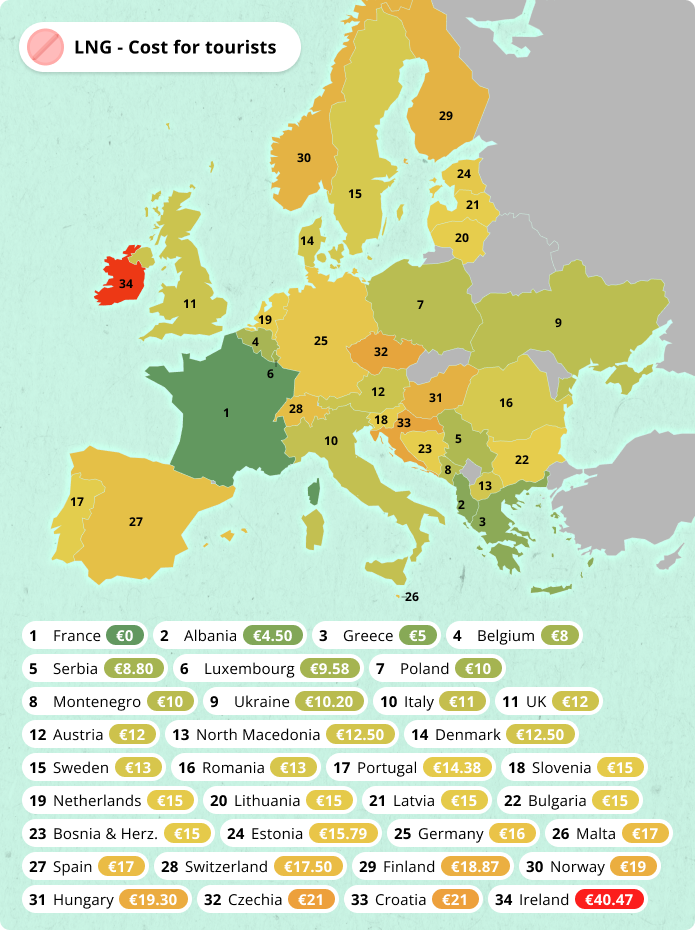 Prices listed as from, as costs can vary dependent on brand.
Prices listed as from, as costs can vary dependent on brand.
For many, these price tags could be seen as more than just inconvenience - it’s a barrier, especially for younger travellers or those on tight budgets. In fact, 13% of Brits said they have previously not used emergency contraception because it was too expensive.
“The reality is that accessing emergency contraception abroad can be unexpectedly costly, and for many travellers - especially younger people or those on a budget - that can be a serious obstacle. Planning ahead by understanding local rules and bringing contraception, like condoms or oral contraceptive, with you can help avoid stressful and potentially expensive situations while you’re away.
“Practicing safer sex - including consistent condom use, regular testing, and open communication with partners - is key to reducing the risk of sexually transmitted infections and unplanned pregnancy” - Dr Bhavini Shah
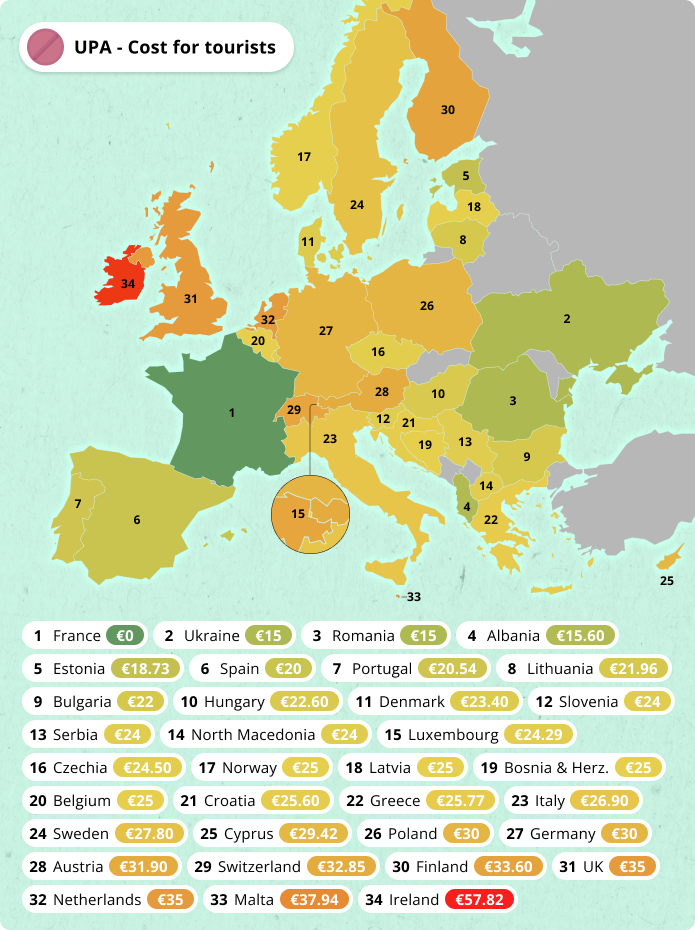
How EC can be accessed / government policies
It’s not just price that can be a barrier, but knowing the local rules and regulations regarding accessing the morning after pill, and where to find it. For instance, the Netherlands sells LNG over the counter in pharmacies and drugstores, but UPA can only be found behind the counter in pharmacies (but can be purchased without a prescription).
Similarly, in Ukraine, both LNG and UPA are officially prescription only, but in practice they’re both commonly sold over the counter in pharmacies, while Cyprus doesn't sell LNG at all and only has UPA available over the counter in pharmacies.
As established, a growing number of countries are now providing EC free of charge, especially for the younger demographic:
- France, Finland, Luxembourg, and Ireland all now offer free EC at pharmacies or public clinics, often to all ages
- In Germany, Ireland and Italy, those aged under 20-25 can access EC for free, or at reduced cost with a prescription
- In Belgium and Luxembourg, ID-based subsidies cover most or all of the cost at pharmacies
“Beyond the cost, one of the biggest challenges people face when trying to access emergency contraceptive pills abroad is simply knowing the rules - where to get it, whether it’s available over the counter, and if age or prescription requirements apply. These differences can be confusing and stressful in the moment, which is why doing a bit of research before you travel can make all the difference.” - Dr Bhavini Shah
The most important thing for tourists and holidaymakers to remember is where emergency contraception can be bought over the counter, and which countries require a prescription.
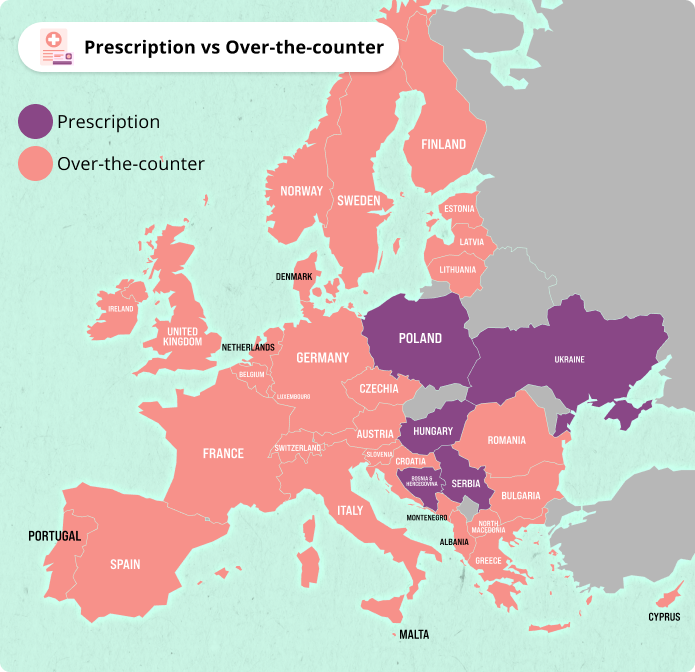
As well as OTC options, a few countries provide levonorgestrel pill (LNG) EC access on shelves in drugstores / supermarkets, where a pharmacist consultation is not always required:
- Denmark
- Sweden
- Netherlands
- Norway (only 18+)
For more information on obtaining emergency contraception, visit our advice on where to get the morning after pill.
What Brits should know before they travel
Wherever you’re travelling in Europe, knowing the local laws, language tips, and online options can ensure you’re prepared, which is why we’ve created a little checklist for your next trip away, helping you stay in control of your reproductive health wherever you go.
1. Know the local laws in Europe
Emergency contraceptive pills are available in most European countries, but some regulations do differ. If you’re unsure, refer to the European Consortium for Emergency Contraception (ECEC) Country-by-Country Information.
2. Bring contraception
A common question is whether you can take contraceptive pills with you abroad on holiday. The answer is yes, always double check you have your preferred contraception packed, whether that’s condoms, the pill or anything else. Carry contraception and EC in its original packaging to avoid confusion or issues with airport security.
3. Try and remember how to ask for EC in the local language
More than 1 in 10 Brits (13%) said that having to ask for EC in another language would stop them from purchasing it, so it’s worth trying to remember the phrase, or having it written down somewhere.
4. Check online EC access options in Europe
Many European countries allow the option of ordering EC online - similar to the UK. Before travelling, make sure to check whether online access is available in your destination.
Some countries include:
- Germany: Some online pharmacies like Apotheke24 provide EC without a prescription
- France: EC can often be obtained online through services like Doctolib or local pharmacy websites
- Spain: Websites such as Farmacia Online offer EC with or without a prescription, depending on your age
Plan ahead to stay in control
Whether it’s sun, sea, or a spontaneous summer fling, the last thing you want to worry about while you're away is navigating confusing healthcare systems or struggling to access essential contraception. While attitudes and access to emergency contraception vary across Europe, being prepared can make all the difference.
Methodology
Survey data
Emergency contraception surveys consisted of 1000 UK adults (500 men and 500 women). Surveys conducted April 2025.
References
https://www.nhs.uk/contraception/emergency-contraception/
https://lloydspharmacy.com/pages/morning-after-pill
https://www.ec-ec.org/emergency-contraception-in-europe/country-by-country-information/
https://www.radiofrance.fr/franceinter/la-pilule-du-lendemain-bientot-gratuite-pour-toutes-les-femmes-en-cinq-questions-3850470





